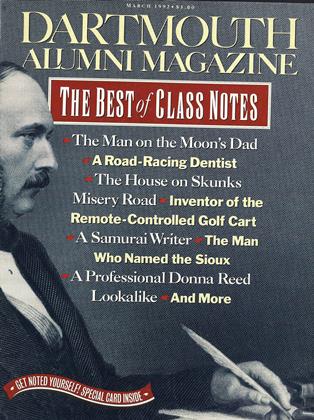When we read class noted, we are getting more than news.
in recent class notes, we received the folk lowing news: that the headquarters of the class of 1921's 70th reunion was the infirmary. That Samantha Husband, great-granddaughter of Dick '26 and Dorothy Husband, is the first girl in four generations of Husbands. That George Davis '28 has finally stopped riding his motorcycle. And that a crow hit Cal Fisher '32 in the back of the head—twice—while he was walking through Victoria, British Columbia.
"Where are you in the cross-section of existence?" wrote Carrie Luft, secretary of the class of 1989, in her column recently. True to the literary aspirations of many class secretaries, she was paraphrasing William James. And why shouldn't she? Class Notes are the raw material of literature. They are about births and deaths, habits and mores, and all the human verities. Literature is detail, said Dorothy Sayers, and what are Class Notes but the amalgamation of human detail? "They are nothing less than a coda to the Old Testament, wherein we learn who begat whom and when (and where they went to school)," says John Pierce '71, publisher of The Old Farmer's Almanac. Class notes offer us believable (well, they are real people), empathetic characters who grow over time and eventually die. Some of these characters are unforgettable. Frank Gilroy '50, playwright, novelist, and screenwriter, tells of one:
"Two or three years ago I was browsing through the Class Notes section and read an obituary of a man who was an executive at some company in New York. His office window, which must have been in a skyscraper in Manhattan, overlooked the Hudson River. And from looking out his window, he fell in love with tugboats. At some point he gave up his job and became a tugboat captain—and that's what he did for the last 20 years of his life. I don't know the man's class and can't remember his name, but that story stays with me still."
The columns also comprise an unparalleled institutional memory. Consider this: When the first Class Notes ever published in this magazine were run in December 1905 by editor Ernest Martin Hopkins '01, some of the alumni mentioned had lived through Andrew Jackson's presidency. Some were to live to see men on the moon.
With the beginning of the columns came the idea of Dartmouth as an extended family. "Class Notes are a form of substitute autobiography," says Dartmouth English Professor Lou Renza, "an autobiography where people try to define themselves in relation to their time here and to friends and classmates who shared a very important experience. The biographical tidbits in Class Notes, in turn, get translated into autobiographical memory. People maintain, by those notes, a continuity with the past and a comparison with it." In other words, people who write and read them touch basethey revisit the beginning of their mature lives. If they choose to read back through the notes of older graduates, they can even watch themselves grow vicariously through marriage, children, professional achievement, new life choices, retirement, death. It can be scary, reading Class Notes. One acts out the Dorian Gray story on a vast scale, a picture ever youthful, ever aging.
So let's go the other way, getting younger through recent notes. Railroad artist Howard "Foggy" Fogg '38 weighs the same as when he entered the army in 1941. Jim Cartwe11 '53 has designed a remote-controlled golf cart for people who like to walk but not carry the clubs. Mary Donovan '74, now a law school dean, still gets collect calls from jail from prisoners she represented when she was a criminal lawyer. As the new general manager for the New York-New Jersey Knights, Reggie Williams '76 offers daycare ("Knightcare," he calls it) for the kids of parents who attend games. And (we like this item best) Mike Kanarijck '90 and Mike Uram '90 found the Dartmouth Alumni Magazine on sale for 75 Baht, or $3, in an outdoor bazaar in Bangkok. A meal in Bangkok is worth 12 Baht, note the Mikes. Try to find a novel that contains such humanity and makes it believable. This truth is not so much stranger than fiction, but it pulses with real blood, with people we know, including, sometimes, ourselves. This isn't just news. It is a cross-section of our own existence.
WilliamJames isduly noted.
After decades on hisHarley, George Davisfinally dismounted.
Veteran Foggy Foggpaints steam trains.
Jay Heinrichs is the editor of this magazine.
 View Full Issue
View Full Issue
More From This Issue
-
 Feature
FeatureThe Best Class Notes of All Time
March 1992 -
 Article
ArticleDivers Notes & Observations
March 1992 By E. Wheelock -
 Class Notes
Class Notes1969
March 1992 By Thomas Lynn Avery -
 Class Notes
Class Notes1965
March 1992 By Jack Heidbrink -
 Class Notes
Class Notes1980
March 1992 By Daniel Zenkel -
 Class Notes
Class Notes1983
March 1992 By Kenneth M. Johnson
Jay Heinrichs
-
 Cover Story
Cover StoryThe Scholar President
June 1987 By Jay Heinrichs -
 Article
ArticleStatement of Ownership
NOVEMBER • 1987 By JAY HEINRICHS -
 Cover Story
Cover StoryTHE MEDICAL SYSTEM’S EMERGENCY SURGEON
JUNE 1990 By Jay Heinrichs -
 Article
ArticleENGINEERING THE FUTURE
FEBRUARY 1991 By Jay Heinrichs -
 Article
ArticleBeyond Scrapbook
May 1994 By Jay Heinrichs -
 Article
ArticleStatement of Ownership, Management and Circulation (Required by 39 U.S.C. 3685).
OCTOBER 1994 By JAY HEINRICHS
Features
-
 Feature
FeatureNotebook
MAY | JUNE -
 Feature
FeatureAdrian Bouchard's Dartmouth
SEPTEMBER 1983 By D.C.G. -
 Feature
FeatureDeath and Memory
Sep - Oct By PHIL KLAY ’05 -
 Cover Story
Cover StoryA 10-STEP PROGRAM FOR GROWING BETTER EARS
Sept/Oct 2001 By ROBERT CHRISTGAU '62, VETERAN ROCK CRITIC -
 Feature
FeatureTHE FIRST FIFTY YEARS
OCTOBER 1963 By SIDNEY C. HAYWARD '26



